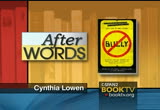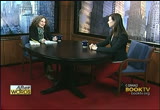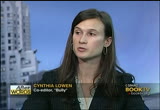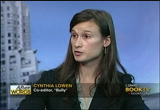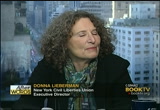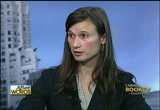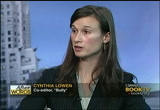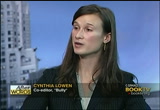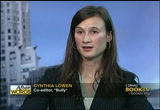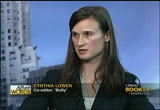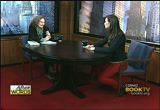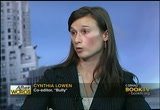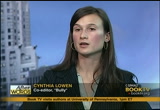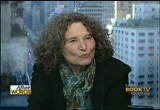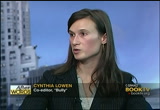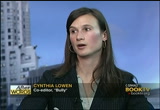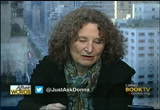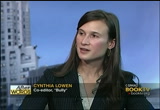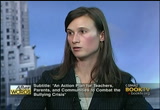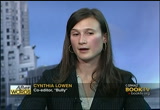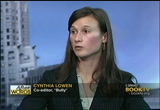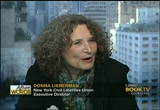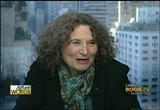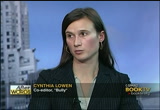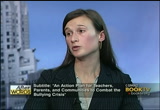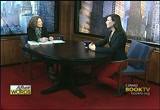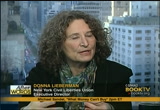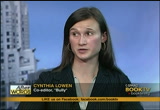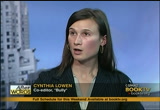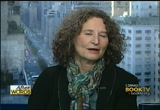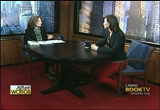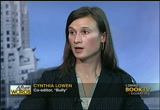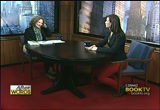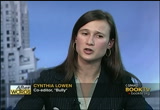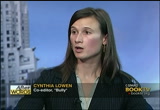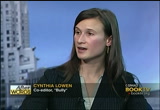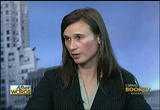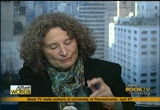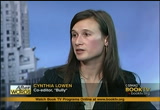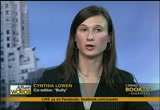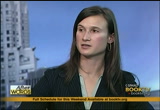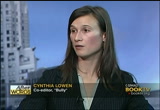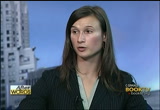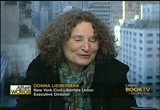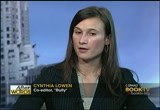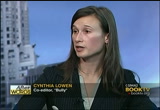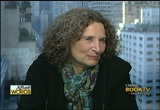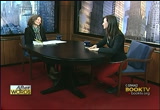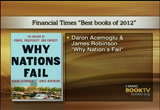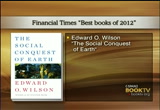tv Book TV After Words CSPAN December 23, 2012 12:00pm-1:00pm EST
12:00 pm
words," with guest host anti-bullying advocate and the executive director of the civil liberties union donald leiber match. in it, cynthia lowen who presents personal stories and essays from anti-bullying activists and experts on how to stop the epidemic of bullying in the u.s. >> host: i'm so delighted to be here today with cynthia lowen, the producer of the widely-acclaimed and really important new documentary "bully" and the co-editor of the book by the same title. both of which out our nation's dirty little secret about bullying in schools across america. both the movie and the book put a human face on what it's about, how it impacts kids on both
12:01 pm
sides and on the sidelines and their families. so thank you so much, cynthia, for being here today. >> guest: thank you, donna. >> host: why don't we start with you telling us a little bit about yourself. how did you get here? how did you get drawn to the issue? why bully? why you, why now? >> guest: well, i come from a background as a writer, and when i was in middle school, i was one of the kids who was really shy, um, i i think i tried to sail under the radar, and i was someone who i saw bullying taking place around me, and i didn't know what to do about it. and as all of us, i think, in this country were starting to see people coming out and talking about their experience of this phenomenon that so many of us had experienced in one way or another and had had no words for other than adolescence, other than growing up. um, when finally people were starting to stand back and say, hold on, this isn't actually a
12:02 pm
normal part of growing up, this isn't a normal rite of passage. i think there was a moment where there's a possibility for change. and director lee hirsch and i decided to start the film out of that feeling that voices were kind of bubbling up, coming up to the surface to say this isn't something that we can accept anymore as a normal part of our culture. so in the span of 2009, in april of that month, it was right after two young people took their own lives, one in atlanta and carl walker hoover in springfield, massachusetts. and both of those tragedies really, i think, ignited a national recognition of what had been going on for so long. and we were seeing parents writing in to message boards, we were seeing on every news story that came up you'd read in the comment section hundreds of comments from parents saying my child is going through this,
12:03 pm
from kids writing in themselves saying i'm going true this, and i feel hopeless and helpless, and i don't know what to do, from educators writing in and saying we don't know how to handle this. we don't have the tools to respond to this. and we decided at that time to start meeting the kids and families and educators who are really on the front lines of this issue. >> host: so why -- what's the difference between, like, teasing and bullying? is, is everything bad that happens to a kid bullying, or is it, is there some, like, global definition of bullying that really works? >> guest: yeah. yeah, i think everyone will be teased, and i think that we all in our lives tease each other. i think that there's, there are things that are, you know, good nature,ed, and teasing is part f
12:04 pm
our way of communicating with each other. and not all bullying, not every fight is a case of bullying. there are instances where there will be conflict where two kids may fight, there'll be violence, and that's not necessarily bullying. it is bullying when there's an indifference in power, when the target does not have the ability to make it stop, when it is something that is going on over time, um, continued abuse which the end game is to isolate them, to alienate them, to humiliate them and can to prevent them from being part of the community. >> host: and is bullying something that is, um, mainly or just about words? is it, um, just physical? is it a combination? >> guest: today i think we're seeing it takes all different kinds of forms.
12:05 pm
something that parents often ask me is, is bullying worse today than it ever has been before, and i think that we've heard a lot about cyberbullying. there's a lot of awareness growing around the ways in which bullying is finding sort of new platforms and new ways to take place. and while that is absolutely a significant piece of the picture, um, the good old-fashioned bullying is still quite alive and well. so i think that it's something that is happening in physical interactions. in "bully" we see a child who every time he gets on his school bus, he's pretty likely to know he's going to be shoved by someone, he's going to be pushed by someone. he may be poked with pencils or pushed out of his seat. he's going to hear things. um, people are going to call him names. and i think that's something that's very pref element. -- prevalent. among girls, though, it can be os that siization.
12:06 pm
it can be everyone in a grade has decided to throw a party, and somehow, you know, you're made very aware that you were not invited to this. so social exclusion is a big part of it. and then again online, passing pictures, spreading rumors. so i think that it takes a lot of, a lot of different forms. i think what underscores bullying and i think why it is so hard to work out is that it's about social dynamics. it's about social hierarchies. and the relationships between kids and clements as they're growing up -- adolescents as they're growing up, particularly in middle school where they're jockeying for power, where they're figuring out how to use their social power, it's complicated. the child who may be the most popular perp on their sports team may be the same person who's bullied when they get on their bus. so it reflects, i think, the social dynamics of a group, and
12:07 pm
those dynamics are always changing. so i think that's part of what makes it really, um, not just kind of one, one thing that we can say, oh, this is bad, and we need to stomp it out wherever we see it. i think we have to understand what's taking place among kids who are really sophisticated in a lot of understanding the dynamics of who has power and who doesn't. >> host: so how prevalent is bullying? how -- what -- can you give us some information about, like, how likely, um, children generally are to face bullying? >> guest: uh-huh. >> host: and also whether there are special populations of kids who are particularly, um, vulnerable? >> guest: absolutely. um, we know that 13 million kids will be bullied in the united states this year, last year. that's, that's a lot of kids. we know that, um, kids who are lgbt are four times more likely to be bullied than other kids.
12:08 pm
>> host: and that's kids who are gay, lesbian, transgender, bisexual, questioning -- >> guest: yes. >> host: -- or perceived to be. >> guest: absolutely. that's another -- kids don't necessarily have to identify as gay to be picked on or harassed for not fitting gender stereotypesment that is another big part of the picture. another population that is very vulnerable are kids with autism. a very high number of kids on the autism spectrum are bullied. often kids who are at the height, what they call high-functioning autism, um, they're mainstreamed into schools. so they have great grades, they, um, look like everybody else, and yet they have a disability that's invisible and which plays out in social context of not understanding social science, of not understanding that the behaviors that someone may be doing are bullying and are not
12:09 pm
friendship. so they're very at risk. >> host: and you describe in the book that kids with special needs, um, for them bullying is really a pandemic. it's that prevalent. >> guest: yeah. absolutely. >> host: uh-uh -- uh-huh. >> guest: one of the things aside from kids with autism, kids with learning disabilities, kids with dyslexia, we have an essay by joe pantaliano who talks a bit about having gone through his adolescence and there being kind of bullying all over the place, and it coming out in different ways in his community but realizing later in life that he's, um, disselectsic. and i think a lot of adults will now, now that i think we have a lot of awareness about learning disabilities, will look back on their time going through middle school, going through high school where they were considered to be stupid or not intelligent for what we now
12:10 pm
understand is a learning disability. >> host: and just to clarify for the viewers, um, who's joe pantly yang know? >> guest: he is a well known actor who is probably most well known for his role in "the sopranos." sort of irony. [laughter] >> host: right. and you mentioned junior high school kids. is there a subset in junior high school that's particularly vulnerable? >> guest: well, what we know about what's happening in junior high and what makes it such a hot spot for bullying is that our kids' brains are changing. the literally like their sort of frontal cortex is rearranging, um, their behaviors are more impulsive, um, they -- any of us who have been there or who have kids who are there can feel like my child has turned into a total alien. a lot, a lot of emotion, a lot of hormones, a lot of, um, just
12:11 pm
really learning how to process things. and what happens is in that phase is that you can make a lot of decisions that you look back on later and say, gosh, like i really didn't think that one through. um, another thing that's really happening at that point is the influence of peers is becoming more important than the influence of family or parents. so there's a real shift that takes place in who the kind of important elements are and where they're looking to for support and for acceptance. and i think that's what really makes some of the jockeying for power, for popularity really feel like this kind of almost life or death thing when you're in middle school. if you've been ostracized, no one will sit with you, no one invites you to things, it can feel like the entire world has turned against you. and i think with what we see taking place online and on the internet that sense that the
12:12 pm
entire world knows something about you or has spread a rumor about you or doesn't like you can feel, can really snowball or very quickly when messages are being spread on facebook or text messaging and stuff like that. >> host: so is it, it's really about difference. kids who are perceived as weaker, perhaps, and different in whatever way, shape or form it is. i'm sure that there's bullying that goes on of kids who are perceived as overweight or underweight or of one national origin or another. i know here in new york we had several incidents where some sikh kids were targeted by bullies and physically
12:13 pm
assaulted. so it's about, um, really a way of not coming to terms with differences. um, is there anything about the families of kids who are bullied that allows any sort of, you know, conclusions to be drawn, or does this cut across like all different kinds of families? >> guest: i think families are a huge part of the picture across the spectrum, across the spectrum of kids who are bullied, those who are bystanders and then the true manifest bullying behaviors. and i think that's one of the things that is really needed when we look at bullying. we can't just focus on what happened for the hours that kids are at school. i think that there's been a huge amount of pressure put on educators to address bullying when they see it in their schools. there are laws passed, um, to varying degrees of, um,
12:14 pm
effectiveness that have really mandated that schools must be aware of this issue, they must be providing professional development, and i think we've gotten to a point over a very short period of time, really since 2009, where i think schools see their responsibility in regards to this issue in a totally different light. that said, i think that bringing parents into the fold and working with apartments on this -- with parenteds on this remains very difficult. i think that schools are scared that if they admit that this is a bullying problem taking place, that they'll be attacked or that they may be liable to lawsuits. um, i think they feel very vulnerable in their ability to say we have a problem here, we need help, we need tools, and we're trying to work on this. so i think that parents of kids can be empowered in a lot of different ways. i think that one of the things that we see in bully is that alex doesn't tell his parents,
12:15 pm
and this is absolutely what happens. parents do not necessarily know what's going on with their kids when they walk onto their bus, when they're at school. and i think that often kids will know when their parents are under stress if there's a lot going on at home and parents are busy. if, you know, the communication isn't great. or even if the communication is great, often kids are ashamed, they're afraid that, um, either their parents won't take them seriously, or if they do take them seriously, that they're going to march into school and do something that's going the make the situation even worse. and in situations where kids don't trust that the adults are going to be able to make the situation better or make it stop without actually, um, making them feel more alienated or making the bullies know that
12:16 pm
they've told someone in such a way that now it's going to get even worse, kids don't want to tell. and i think the kids often don't necessarily even want to perceive what's going on as bullying. so i think that one of the things for parents who suspect their kids may be bullied or any parent is to find ways to talk to their kids about what's going on at school in a way that isn't necessarily saying are you being bullied. >> host: uh-huh. well, you know, you raise an interesting point. it kind of rolls off the tongue, finding ways to talk to your kid about what's going on in school and to identify whether there's bullying going on. but i think that it's probably fair to say that most parents, um, would give their left arm to know how to do that. what kind of suggestions do you have for parents or to help their kids talk to them? >> guest: absolutely. i think it yets harder -- it
12:17 pm
gets harder as kids get older and very much want independence, and they want to be able to handle situations on their own. and so i think that at different levels the questions and the conversations can be more or mor less direct. i think for kids who are at younger stages or at the end of element i school, it can be much easier to broach the topic. um, questions or conversations about, you know, who fits in with the group, who's sort of playing with whom, who seems to be ostracized. i think those questions can be answered more directly for kids who are younger. i think when kids get to middle school, it's more round about. i think one way of getting a sense of what the social fabric looks like at a school is asking questions about cliques. i think kids are fascinated by changing cliques, changing social dynamics, um, how different groups identify themselves. i think asking some questions,
12:18 pm
um, or kind of getting a sense through conversations about what's that social fabric looking like, where to you feel like you fit in? where do you feel like you're not wanted or who are you intimidated by? >> host: are there, can you give us examples of questions that you think work for kids? we all know that, you know, are you being bullied in school does not work. >> guest: yes. [laughter] because they're like, no, definitely not. um, i think questions around things like drama. um, is there drama going on in your group? if you have a group of kids over, and you notice that someone's not there, where, where is janine today? what's going on with her? is everything okay between you two? um, i think the question, some of the questions that were brought up before, how do kids kind of break down? who's wearing what?
12:19 pm
who -- what do you call the different kids in their groups? how do they identify? and what are some of the things that they do together or that they don't do, or who's part of that group? simple questions like who do you sit with at lunch? some kids will be open to answering that, some won't. but i think that those are some ways to get into it. after school activities. what are some of the things that are available? what interests you? if your child was interested in something and then suddenly seems to be withdrawing from that, i would definitely probe a little further. maybe it's just that their passion's changed, their interest changed. that's happening all the time. but maybe it's because there is a group dynamic within that activity that's become toxic somehow. >> host: do you -- when we say that it's the responsibility, that all parents -- i mean, we
12:20 pm
know all parents want to know what goes on in school, and all parents have a tough time finding out. that's the given. but the object of finding out what's going on in school is in part to know whether your kid is being hurt, terrorized, bullied. but it's also, i would imagine, important for all parents whether or not their kids are being bullied to find out what their kids' role is in the social fabric. parents, i'm sure that there are lots of parents who think their kids are perfectly happy in school, and it turns outta they may have like -- out that they may have, like, there may be a bull hi. >> guest: yeah. >> host: so questions like, you know, what's the atmosphere like on the school bus, you know? what's the school bus like? is that fun, or do the people
12:21 pm
hate it? >> guest: where do you sit on the school bus? >> host: yeah, uh-huh. >> guest: that's a great question. i think that you'll find a lot of kids will sit -- in my school bus, you didn't go to the back of the school bus unless you really wanted to, like, get it. so i always sat at the front of the school bus because i was, like, terrified of what was going on back there. so i think that's a great question. you can learn a lot about what that little ecosystem is like there by what's going on, where do you sit, where does it seem not really safe? where do you feel safe? um, i also think parents kind of know a lot more about the social dynamics within the groups of kids that will come to their house after school or that they'll see on the weekends or that they'll drive. i think just like being involved in your child's life, um, and making sure that, you know, they're there for dinner every
12:22 pm
night. i think family dinners are a really important time where it's possible for parents to be there, um, often it's not possible when parents are working or have other commitments, but i think making that time to make sure that there's a safe place at home where even when, you know, i remember when i was in high school, you know, i really -- i'd go with my parents, and the last thing i wanted to do was sit down to dinner, but i knew what we did every night. just spending that time together, things come out. so i think that it's important. i think right now there are incredible pressures on families, and i think it can be very, very difficult to be able to take the time to just sort of stop and put down the iphone, put down the computer, turn the tv off and just sort of be present. um, and i think that that's one way that just sort of --
12:23 pm
[inaudible] some of that information, feelings, patterns or things that seem to be out of whack often will arise. >> host: now, when you were making the documentary, there came a moment when you took off your film maker hat. that was with alex. >> guest: yeah. >> host: tell us about that. >> guest: we'd been following alex, as you know, through the school year and were aware that he was being bullied on the school bus. and it was something that was escalating over the course of the school year. we had let the school know early in the school year on the first day that he had been punched, and the response was sort of, yeah, you know, school buses are pretty rough. they're pad. um, but -- they're bad. but nothing was done.
12:24 pm
and as we were witnessing alex getting bullied more severely over the course of the year and as we knew thing were happening when we weren't there, um, we came to a point where we knew that on the one hand our respondent to the film -- our respondent to the film and our partnership with alex who'd been going through this for years, on the one hand the responsibility of the film was to say this is what kids are going through, and we're not going to gloss this over. on the other hand, our responsibility is to alex and to the family when the school didn't intervene after we continued to tell them that the dynamic on the bus was dangerous for him. we decided that we had to show them the footage and to to make sure they knew exactly what we were talking about. >> host: so you're a top flight film maker, but you're a person first. >> guest: absolutely. >> host: and you made the
12:25 pm
decision to abandon your film maker posture and become a responsible bystander, um, that you talk about in the movie and in the book who can be so important in getting things under control and helping kids not be victimized. by bullying. there's one group of people that i just want to ask about quickly which is school resource officers, school safety officers -- >> guest: uh-huh. >> host: you know, police in schools. they operate with a lot of different hats on. just quickly before we take a quick break, um, what roles do they play, and are they sometimes part of the problem? >> guest: in alex's school there was of a school resource officer two doors down from the assistant principal who didn't
12:26 pm
report any of the faults, any of this behavior to the school resource officer. i think the school resource officer in cases of bullying can be a great resource. not that you want to create a record for someone in middle school, but you want them to know there are consequences to this behavior, and the consequences only get realer as you get olderrer. so their really yea son, i think, between the consequences that behaviors can have when kids are younger are changing and are making impulsive decisions and their ability to say, you know what? i have to be responsible for my actions and these are not behaviors that i can do. the response of the adults who were supposed to be there helping them, respecting them is really critical, isn't it? >> guest: absolutely. >> host: to what happens to these kids. all right. um, i think we'll take a quick
12:27 pm
break now, and we'll come back, um, and talk more about some of the solutions to the problem. this is, bullying is, um, it's probably easier to spot than it is to fix. >> guest: absolutely. >> host: and i think that if we, um, if we don't take a comprehensive approach, sometimes we can make things worse by bumbling. >> guest: yep. >> host: and our kids are too precious to bumble with, aren't they? >> guest: yes. ghs okay. so we'll take a quick break, and we'll be right back. great. thank you, donna. >> on the go? after words is available through itunes and xml. visit booktv.org and click podcast on the upper left side of the page. select which podcast you'd like to download and listen to after words while you travel.
12:28 pm
>> host: so let's just talk a little bit more about these school resource officers and school safety officers. more thoughts. >> guest: absolutely. i think that they can play a really important role in these scenarios when they start to escalate into situations where you have text messaging, where it's being, um, where bullying is having over facebook or where it is involving more serious incidents of physical assault. one thing that i think participants find -- parents find is that when they have tried to resolve a situation through the school or through, um, if they've gone to a facebook safety page and have reported what's taking place on facebook and it's still continuing, i think that turning to police for help is something that a can be a really important step for parents to take. however, i think what often
12:29 pm
happens is that these instances are looked at as something that is sort of taking place among kids, that it's, um, beneath the role of the police department to deal with. i think the perception can often be that they have much more important things to deal with. each for school resource officers -- even for school resource officers, often their role is more to be working with kids who are already in the juvenile justice system to serve as a liaison within the schools for issues like that and not necessarily dealing with behavioral things as they come up. i think that if schools can partner with police departments to educate them about bullying, um, to work together about investigating instances of cyberbullying, many police departments in the united states now are developing cyber crimes units so that they're equipped to say, okay, we can figure out where this message came from, what the computer's ip address was, and they can figure out
12:30 pm
where some of these things are coming from, i think that can be a really helpful tool for parents who have gotten to the point where they feel helpless and hike they've investigated a lot of the alleys that they have to try and resolve a situation that is pernicious and persistent. >> host: and so where you have police officers stationed in the school, i mean, in new york city, for example, there are 5,000 of them -- >> guest: right. >> host: do you ever hear about, um, how they interact with students? and are there ever problems with school safety officers actually being sort of bullies themselves? >> guest: i'm sure there are instances, you know, there are instances where teachers are, um, found to be bullying and harassing their students. >> host: uh-huh. >> guest: i think that, absolutely, those things happen. and i think that we don't want
12:32 pm
>> i think it's the same thing that comes down to what happens in a building where all of the adult teak is seriously and it's about culture. it's not about were not going to do the site behaviors because those are holy. it's a connect the overall picture of the culture and climate in the school and one of the things is that strong leadership really start to talk that principle have a great deal of influence over how all of the adults in their building treat not only the kids, put each other. there're buildings like the school we saw in "bully," we heard and supposed to intimidate other people underneath, in this case the man, underneath him. what happened in the scores of his normal for people to feel scared. his former to feel intimidated. because the teachers and assistant principals thought to
12:33 pm
herself, there is not empathy when they start taking place because there was something with inevitable part of the school. when you're in a school where the leadership is very different, where there is a more lateral roche where people feel safe, where hierarchy is not very stringent and constantly reinforced. there's a lot more opportunity for kids to be project it and a lot more opportunity for adults to see a need resources, i need help to get the kinds of tools they need. in alex's situation again, we saw a disaster ever saw was going on, but didn't pull over. bus drivers, recess aids, those that serve lunch are in a school is hierarchy at the low end of the totem pole.
12:34 pm
they're not incorporated into the leadership or the same unsupported ways that teachers are. as a result to which they don't feel they can take the time out to be supported if they stopped the bus and deal with it. what happens if their 15 minutes late to school? it's about realizing that everyone, not just sro officers and teachers have a role to play in the so-called hotspots in schools are those look overpaid given the least amount of authority advocates recognize someone hasn't been respected by the other adults in the building, they don't give those people their respect either. >> so the hotspots. those are the cafeteria in the locker room and the school bus and those are places to watch
12:35 pm
out for and it's also essential for the school principals to make sure that the folks who work in most places, the adults who were there are accountable for what goes on, but that they know they have the opportunity to be heard in the obligation to speak with the school leadership about what's going on. that's a really important point. you know, there are so many different players and our society over the issue of bullying. give us a couple of tips, like give us tips that a student could do to reduce the likelihood of bullying or
12:36 pm
respond in a set or situation. >> this is a reason why we wanted to create this book because one of the things we do in the film is a good shot that making people aware of the extent to which this is happening, but it's a crisis and it's not okay to accept. but we wanted to do was provide people a place to go to when you get to the point where you say okay, we need tools to do this. now what are those tools? one of the things the contributors to the book talk about are what can you do from various perspectives? from the other parents and kids who are either bullied or bystanders and from the u. of educators feared one of the
12:37 pm
things from the kid's perspective is that there's a lot of power in numbers and where you can have a social dynamic where if you're a young person who knows you have some social cachet in your circle, and your social dynamic, you may feel comfortable than most around you, you may feel more confident. for kids who have the confidence and know they are influential among their peers, for those kids to be educated about bullying, for them to say want to be a student leader and i'm committed to standing up. one of the contributors to the book, brandywine garden talks about the brave against bullying initiative and there are wristbands the american federation of teachers of made available so any teacher who wants to can get the rest beyond
12:38 pm
online and now display visible sign that kids know they are safe person to go to, that they are someone who has made a decision to prevent bullying and respond when they see it. visible signs like that, not only for teachers and administrators, those are really affect it, but also for young people. there are a number of creative things you can do to make a visible sign to stay on the safe person for you to go to when you're being targeted by bullying. >> host: they talk about how kids like to be confident and hopeful and i was impressed by the story in the book from mike mulgrew, president of ust in new york city, when he was teaching
12:39 pm
he would identify kids who were at risk and bring them into his classroom and asked his class to support them and work with them. she seemed like a common sense but brilliant approach to making everybody part of the solution and raising all the those. >> guest: absolutely. one of the things we see often with kids who have special needs, learning disability or autism, so often the philosophy is to help give those kids tools to not be targeted or make them less likely to be targeted and avoid certain situations. >> guest: to avoid certain areas of the school that we know kids are vulnerable and where there is little supervision. that's only one piece. it's a case of social security
12:40 pm
skills, like autism is a social disability. one thing we have to do a better job and michael milbury's essay speaks to this is how do you educate the entire community about disabilities like autism or learning disabilities so it's not up to the person whose art is struggling to up were already struggling with social hierarchies to make sure everyone else knows this is the autism looks like. this is why kids with autism may respond differently. this is by someone with autism may have a tick or do behaviors that i don't understand but i see them have been. how can we get kids more aware of differences among them and say we're going to support this person and not ostracized them
12:41 pm
or pick on them because they're different because now we understand what's going on. >> host: is some of this about there being an petite? talk that. >> guest: absolutely. this is why are bush for the film was what it was and wanted to bring the same approach the book. we feel this is an issue so many of the snow is going on. we know numbers are extraordinary of kids being bullied. but it comes down to is understanding what it means to wake up every day and know that you're going to go to school and know that you're scared about what's going to happen to you dare. so many of the people who have not only contributed to the book, the people of the films have never had the opportunity to tell their story before because either there was no one there to listen or present recognized as a problem or because they were ashamed or scared.
12:42 pm
what we wanted to do in the film is give people opportunity to respond to the issue and move hearts and minds of the power story. and i think that's another thing that has been effective not only in bullying, but within empowering kids and helping to build ridges. postcode so one of the standard and unhelpful responses to when one child hurts another, including bullying is say you are sorry. what do you think about that? >> guest: right, we now in some cases when they are told to say sorry, they're not something they did something. they are sorry they caught and that is something we see in the
12:43 pm
film. >> host: so what is the effect of whey to bring the kids together, to build the understanding that makes the child who has done to bullying understand the impact of what they had done for there to be a positive outcome. >> host: by and large the kids involved in bullying behaviors, they are not bad kids. they are kids who maybe have made a bad choice. they are kids who maybe were under pressure and wanted to fit in with other people around them him are doing. i think most kids have it ready profound capacity for empathy. one of the things that happened with alex and we touch on this a little bit following up with the kids in the book after the film came out, what happens for
12:44 pm
everyone, one of the incredible things that happened was when we screamed the film in sioux city for the entire community from the 1600 people came out and the assistant principal, everyone came out and after the film, some of the kids involved with bullying him posted on the project page on youtube something they were sorry about what they had done. he received letters to kids who had laid him. so often you think what can happen is kids don't see the entire picture. they may shove someone at the locker in a way to class morning, but what they don't know if the same person was then called a name that lunch. they were not chosen to be in a team-high gym class. they were tricked in the hall on the way to their their class and that it's not these big huge acts of violence that are the things that can really wear young people down.
12:45 pm
and this is absolutely the case with tyler long, david and tina longs sun who took his own life. i think when kids stop and get to have an opportunity, to look at the things they didn't know were going on, they have a different sense of how their actions may have impacted the person. i think that's where a lot of these stories come in. or i'm just messing with them. they like you don't know all the other things happening. >> host: one of the scariest aspects of bullying and dealing with bullying is potential for this solution to be worse than
12:46 pm
the problem itself. i think you mentioned earlier that kids really are afraid or reluctant to talk to their parents for fear of people just come in and get way and make things worse. or a teacher for that matter. so it isn't easy. it is not just say you're sorry. it is an promise he won't this again. how do you -- how do we encourage -- what does it take to turn a school around? >> guest: i think it's really hard. i think there is no one program. i think there's no silver bullet as they say. there's no zero-tolerance policy. i personally feel that is zero-tolerance isn't not that
12:47 pm
without comprehensive commitment to professional development, to working with kids to creating here mentorship opportunities, they put out that they have zero-tolerance policy but not to the other were so we've got our bases covered. more in the offense that may be they of liability or something like that that they're worried about, but are really into comprehensive work. i think it's a fact is a must to do the detailed work of educating teachers, educating the servers, educating everyone in the building and having the leader who can enroll the adults in the building to outfield assist them in that as a priority for school. we know in situations for you don't have support of the entire school community, bullying prevention programs, whatever they are, will fail.
12:48 pm
one thing that's important is enrollment among the adults. as that reaches to students, one of the things we know is so critical with students, that we know from how they work is that the input of peers can often be more influential than those of adults are teachers. so it can mean more when upperclassman is speaking with him about the culture we have here and this is how we resolve some of spreading a rumor about you and work it out. this is something danica patrick patrick -- is a gross ink? >> host: any talk about girl talk in the book. >> guest: yes, girl talk. the importance of having the older girls who can come talk to younger girls and say we have all gone through this and it's
12:49 pm
really hard and we have to find better ways to respond and be confident. so where you can really get the ball rolling among kids and again, getting kids who are confident, who can really start this and can make being kind cooler than being cruel has a lot of influence over the entire school community and the third piece of the puzzle is getting parents involved. something that was one of the biggest surprises of the film was when i went to get releases from on the parent. every parent the children in the film signed a release allowing their children to be in the film. as you can imagine, conversations are willing in 10, particularly when parents of the kids doing what the severe
12:50 pm
bullying. their response was not only let them be in the film because they want to learn from what they saw it to have the opportunity to see themselves behaving in a way that was really important. they were surprised that they hadn't been engaged by the school to a greater extent about these behaviors. sometimes schools can be hesitant to reach out because they know it's like opening a can of worms and you cannot have to do with parents who may be very defensive come to parents who may be very angry. but for parents who get those phone calls, that could be the best phone call in your life because if you don't know the things are happening, if you don't know your sweet little child is getting on the bus in being a tyrant, you never have the opportunity to address it.
12:51 pm
>> host: and it is in that context is your book talks about the difference between punishment and discipline. >> guest: yes, absolutely. it's not about punishing in such a way as to shut down the conversations about how do we develop understanding, how do we develop empathy? how do we take responsibility for actions? and i think that's really what the hope is for an intervention that's effective is that it doesn't only change the life of the person being targeted, but hopefully changes the life of the person perpetrating behaviors. >> host: i was interested that there are a number of steps laid out in terms of the apology phase. i think one of the significant points that we've made is that this is about shame for either
12:52 pm
the bully or the bullied, but it's really more about problem-solving and understanding. a big component here seems to be, respect all around the schools. how do you make that happen? >> guest: a big part of it is honestly assessing what's going on in our communities. i think again one of the things we notice in schools is that where there's a lot of hierarchy and stratification among the adult, you're likely to find similar among the kids. i think when it comes to respecting all members of our
12:53 pm
communities, that really happens in a lot of places. it doesn't only happen in schools. it happens online. it happens and what we see in the media. it happens in the ways in which we see her families treating each other, treating our neighbors and they think we have to look at what are the kinds of things that we are modeling. you mentioned before that there's been a lot of only in awareness and a lot of targeting of sikhs here in new york city. one of the first we did was a day where they were raising awareness about the bullying they were experiencing. partially it was the result of a lot of the racism and the attacks we were seen in the wake of 9/11 and that muslim case
12:54 pm
were being targeted, seek kids were conflated as muslim kids and being targeted and i was a real reduction of what was going on nationally and in our communities for people no longer felt safe. so it's a big picture and i think that's why it's a tough nut to crack. >> guest: it sure is. what i'm hearing you say is that this is about creating a school climate that is safe for all kids, that all the kids in the adults in the school at whatever level they are working are part of the solution and you can't just dismiss this as kids will be kids for a tougher nut. this is really about fundamental
12:55 pm
dignity and it's unfortunately about life and death for some kids. i think far too many kids are losing their lives to bullying by suicide has been a wake-up call to us. your book and the movie have a lot of resources in them. to want to tell us about your website and resources that are available? that has been some important litigation around these issues and advocacy. what's your website? >> guest: the website is www..the bully project.com. we've done a lot of work to build partnership with coalition that has enabled us to launch
12:56 pm
several different programs to provide viewing guide to go along with the film, to provide opportunities to get involved with the film and social action campaign. >> host: where can people get the boat? people can get the book online. any website again is? >> guest: www..the bully project.com or they can get the book on amazon. >> host: said this has been quite interesting and i want to congratulate you and thank you on behalf of all parents and kids for the contribution you have made to the well-being of all of america's children. >> guest: thank you, donna.
12:57 pm
>> i was trained to come and go to the signature programs with the latest nonfiction books are interviewed by policymakers, legislators and others familiar with the material. train to air saturday and booktv at 10:00 p.m. on saturday, 12:00 p.m. in 9:00 p.m. and sunday from 12:00 a.m. on monday. you can watch "after words" online. go to booktv.org and click on "after words" in the series and topics list on the upper right side of the page.
127 Views
IN COLLECTIONS
CSPAN2 Television Archive
Television Archive  Television Archive News Search Service
Television Archive News Search Service 
Uploaded by TV Archive on

 Live Music Archive
Live Music Archive Librivox Free Audio
Librivox Free Audio Metropolitan Museum
Metropolitan Museum Cleveland Museum of Art
Cleveland Museum of Art Internet Arcade
Internet Arcade Console Living Room
Console Living Room Books to Borrow
Books to Borrow Open Library
Open Library TV News
TV News Understanding 9/11
Understanding 9/11